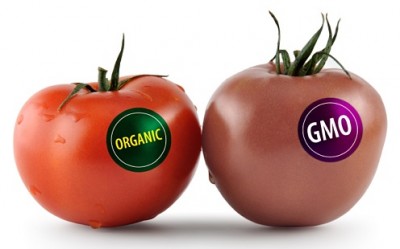Tomato tinkerers go back to the drawing board
Warning: Agribusiness is in the lab again, molesting the “molecular machineries” of Mother Nature’s tomato.
Actually, it’s the already-machined, industrial tomato that lab techs are retinkering. It seems that big produce peddlers have discovered that their red, perfectly-round, tomato-looking fruits are so flavorless as to constitute consumer fraud. Of course, tomato lovers have known this for years but industry didn’t care, for corporate producers had financial clout to force their products into the supermarket bins so the chain stores offered no choice to shoppers. Buy it and weep.
 Indeed, the bland orb was specifically manufactured by land-grant university geneticists to satisfy industry, not consumers. Profiteering middlemen wanted to eliminate small producers and farm workers, grow the crop on huge corporate farms, mechanically harvest it, artificially ripen it, and ship it thousands of miles to markets without rotting. As author Susan DeMarco learned while researching “Hard Tomatoes, Hard Times” in 1972, taste was not even an afterthought. When she pointed out to the U.S. Department of Agriculture’s research director that the reconstructed fruit lacked flavor, he considered that irrelevant: “Your children will never know the difference,” he smirked.
Indeed, the bland orb was specifically manufactured by land-grant university geneticists to satisfy industry, not consumers. Profiteering middlemen wanted to eliminate small producers and farm workers, grow the crop on huge corporate farms, mechanically harvest it, artificially ripen it, and ship it thousands of miles to markets without rotting. As author Susan DeMarco learned while researching “Hard Tomatoes, Hard Times” in 1972, taste was not even an afterthought. When she pointed out to the U.S. Department of Agriculture’s research director that the reconstructed fruit lacked flavor, he considered that irrelevant: “Your children will never know the difference,” he smirked.
But, of course, the children did — they’re the ones who’ve created today’s alternative system of sustainably grown, untampered, locally marketed tomatoes, which have been increasingly taking sales away from the industrial profiteers for the past 20 years. So, has the agribusiness-industrial complex finally learned that high-tech is not always better? Get real!
Actually, they’re getting more unreal, turning again to our tax-funded land-grant researchers to save them from the quality producers.
“I’m 98 percent confident we can make a tomato that tastes substantially better,” Professor Harry Klee exulted to The New York Times last month. He’s head of a team of tomato tinkerers at the University of Florida.
Hmmm. Excuse me, professor, but “substantially better” than what? One of Momma Nature’s own heirloom varieties perhaps? No, no — Klee knows that high-tech tomato flavorologists like him can’t get near that quality. Rather, he’s merely out to endow the industrial, mass-produced fruits of agribusiness with enough tomato-ishy taste to pass as a minimally acceptable version of the real thing.
How? By using a gas chromatograph that serves as an artificial nose to sniff out “flavor volatiles” in real tomatoes. Then, he and his team of geneticists intend to extract a few of the genes that cause a plant to produce flavor and try to place then in industry’s manufactured creation.
Why do this? It’s all intended to help the corporate powers retake market share and profits they’ve been losing to producers of the natural product.
Where did Klee come from? Monsanto, where he was employed for 11 years to help work on that giant’s bioengineered foods. Now he directs the Institute for Plant Innovation at UF, backed by Monsanto. Klee and company say they hope to develop what’s called “a chemical recipe for the ideal tomato.”
That mission raises another question: “Ideal” for whom? It’ll still be a bland, mass-produced tomato doused with pesticides, machine-harvested while green, and shipped across country. It’s only ideal for the maximization of corporate profits. And beware, for the tomato is not the only target of this academic, industrial complex. Klee and company are also redoing the blueberry to be, as the Times called it, “crispy, almost apple-like.” Wow, I bet they’ll next try to manufacture apples to be almost blueberry-like.
Final question: Why are land-grant universities frittering away the public’s scarce research on these corporate projects? Let the multibillion-dollar industrialists do their own dirty work.
Klee claims that it’s all about “bringing back flavor.” But professor — flavor never left. Go to a farmers market and taste for yourself.
- When Greedy Corporations Want a Stupid Law, They Come to Texas - April 1, 2025
- Trump, Musk and ‘Little Buddy’ v. The People - March 25, 2025
- Hey, Democrats: To Defeat Trump Autocracy – Get Out of Washington - March 14, 2025

